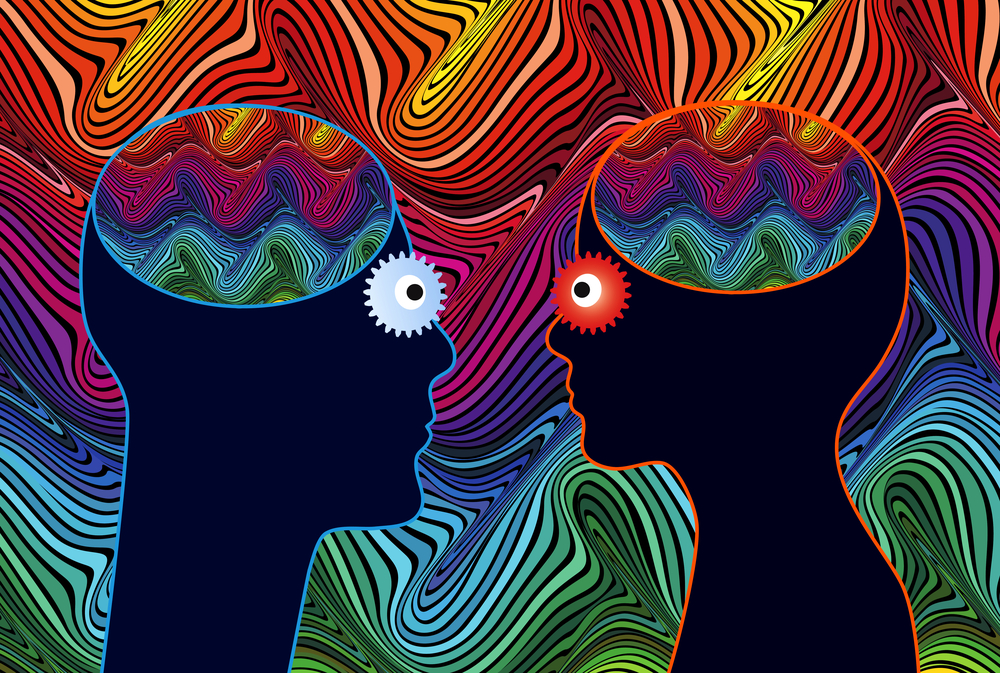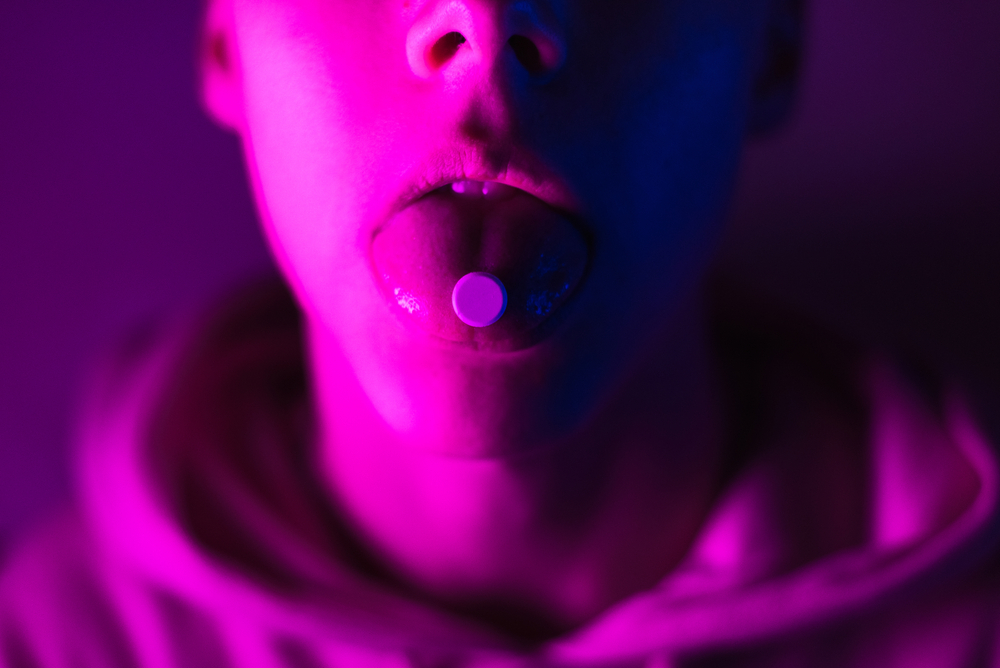Last Updated:
July 25th, 2025
Hallucinogen Addiction | Signs, Causes and Types
What are hallucinogens?
Hallucinogens are drugs that change how you see, feel and think, often making you experience things that aren’t really there. They can come from natural sources, like psilocybin in magic mushrooms or be man-made, like LSD. These substances affect the brain’s chemical signals, creating their mind-bending effects.
Recently, some types of hallucinogens, like psilocybin and MDMA, have been trialled in mental health treatments for conditions like depression and PTSD, showing encouraging results in controlled settings.
But recreational use is a different story. Without the guidance of a professional setting, hallucinogens can lead to harmful patterns of use, impacting mental health and daily life.

Recognising the signs of hallucinogen addiction
Hallucinogen addiction can be difficult to spot, especially as these substances don’t typically cause obvious withdrawal symptoms like some other drugs. However, by educating yourself on the tell-tale signs, you may be able to recognise when someone is struggling. Whether it’s for yourself or a loved one, understanding these indicators can help ensure the right support is found.
- Taking unnecessary risks: Using hallucinogens in unsafe situations, like driving or operating machinery, shows how the drug can override good judgement.
- Withdrawing from loved ones: Avoiding friends and family in favour of using hallucinogens suggests the drug is taking priority.
- Unpredictable routines: Sudden changes in sleep, eating or daily habits often indicate the drug is interfering with normal life.
- Neglecting responsibilities: Missing work, school or important commitments to use hallucinogens is a clear sign of addiction.
- Money problems: Spending large amounts on hallucinogens, even at the expense of necessities, points to dependency.
- Craving altered experiences: A constant need to relive the effects of the drug shows psychological reliance.
- Emotional instability: Unpredictable mood swings, from euphoria to paranoia, are common with regular hallucinogen use.
- Detachment from reality: Struggling to differentiate between hallucinations and real life is a sign of the drug’s mental impact.
- Increased anxiety or paranoia: Persistent feelings of fear or mistrust, even when not using the drug, are often linked to its effects.
- Preoccupation with the drug: Spending most of your time thinking about, obtaining or using hallucinogens suggests the drug has taken control.
Struggling with an addiction? If you are ready to seek help, reach out to us today, and a member of our compassionate team will help you find the best option for starting your recovery journey.
Do I have a hallucinogen addiction?
It’s important to check in with yourself if you’re using hallucinogens. These substances can feel like a way to escape or explore, but it’s easy to get carried away without realising the impact they might have on your life. Below are six questions to help you assess whether hallucinogens might be becoming a problem. If you answer “yes” to any of them, it could indicate an addiction.
- Do you find yourself craving the effects of hallucinogens or constantly thinking about your next use?
- Have you used hallucinogens in situations where it was unsafe or inappropriate?
- Have you noticed a pattern of neglecting responsibilities or relationships because of your use?
- Do you feel the need to take higher doses to achieve the same effects?
- Have you tried to stop using hallucinogens but found it difficult to do so?
- Do you rely on hallucinogens as a way to cope with stress, emotions or life challenges?
Answering “yes” to these questions doesn’t mean you’re beyond help. Recognising the signs is a crucial step towards understanding the role hallucinogens may be playing in your life and seeking the support you deserve.
Are hallucinogens addictive?
While most hallucinogens aren’t physically addictive like cocaine or heroin, they can create a strong psychological pull. This often comes from how these substances change perception and emotions, offering experiences that feel deeply compelling or even necessary to revisit.
For some, the draw is the sense of escape they provide. Hallucinogens can feel like a break from reality, offering intense sensations or moments of self-discovery that are hard to release.
Over time, this need to recapture those feelings can become a way to cope with any stressors in the person’s life, potentially leading to a cycle of repeated use.
Below, we take a look at some of the most common forms of hallucinogens and the issues they can bring with them:
LSD addiction
LSD is an incredibly powerful hallucinogen that can completely alter how someone perceives the world around them. Its intense effects can draw people in, creating a dependency on these mind-altering experiences and leaving them vulnerable to paranoia and emotional struggles.
PCP Addiction
PCP is a highly potent drug that disrupts perception and thinking in a profound way. Its overwhelming effects can lead people to depend on the detachment it offers, often leaving them struggling with erratic behaviour and significant mental health challenges.
DMT Addiction
DMT is an exceptionally powerful hallucinogen that delivers intense, life-altering experiences. These effects can become deeply enticing, with users returning to the drug for escape, often leading to emotional instability and difficulty reconnecting with reality.
How is a hallucinogen addiction treated?
When it comes to treating a hallucinogen addiction, the focus is less on detox and more on therapy. These substances aren’t usually associated with withdrawal symptoms, so the aim is to help you address the psychological and behavioural challenges tied to addiction.
This makes therapy the heart of hallucinogen addiction recovery. Here are the different types of therapies you may experience at a rehab centre:
- Cognitive behavioural therapy (CBT) can help you understand and change the thought patterns that lead to using hallucinogens.
- Dialectical behaviour therapy (DBT) is great for managing overwhelming emotions and finding healthier ways to cope.
- Group therapy provides a space to share and connect with others who truly understand what you’re going through.
- One-to-one counselling allows for deeper, personal conversations about what’s driving your addiction.
- Holistic therapies, like yoga or mindfulness, can help you find calm and reconnect with yourself.

What are the next steps?
If you’re concerned about hallucinogen addiction, whether it’s for yourself or someone you care about, the next step is to seek help. Start by contacting a rehab centre or professional who can provide guidance tailored to your situation. They’ll help you understand the options available and ensure you feel supported every step of the way.
Our compassionate team are ready and available to take your call, and guide you towards lasting the lasting addiction recovery you deserve.
Frequently Asked Questions
(Click here to see works cited)
- De Gregorio D, Aguilar-Valles A, Preller KH, Heifets BD, Hibicke M, Mitchell J, Gobbi G. Hallucinogens in Mental Health: Preclinical and Clinical Studies on LSD, Psilocybin, MDMA and Ketamine. J Neurosci. 2021 Feb 3;41(5):891-900. doi: 10.1523/JNEUROSCI.1659-20.2020. Epub 2020 Nov 30. PMID: 33257322; PMCID: PMC7880300.

